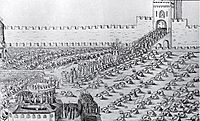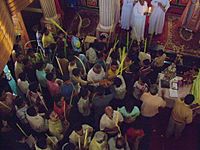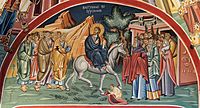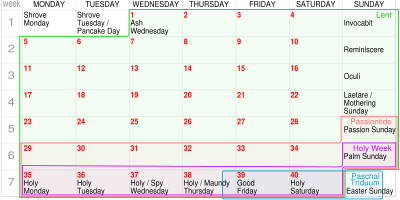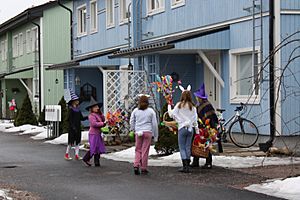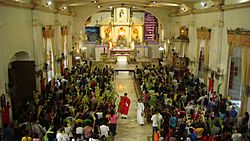Palm Sunday facts for kids
Quick facts for kids Palm Sunday |
|
|---|---|
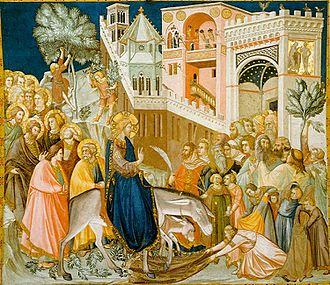
Entry of Christ into Jerusalem (1320) by Pietro Lorenzetti: entering the city on a donkey symbolizes arrival in peace rather than as a war-waging king arriving on a horse.
|
|
| Significance | commemorates Jesus' triumphal entry into Jerusalem |
| Date | Moveable feast, Sunday before Easter |
| 2025 date |
|
| 2026 date |
|
| 2027 date |
|
| 2028 date |
|
Palm Sunday is a special Christian holiday. It always falls on a Sunday, but its date changes each year. This day celebrates when Jesus entered the city of Jerusalem in Israel.
This event is described in the Bible in the books of Mark, Matthew, Luke, and John. On Palm Sunday, many Christians celebrate by going to church. They often use Crosses made from Palm leaves.
Contents
What is Palm Sunday?
Palm Sunday marks the start of Holy Week. This is the week leading up to Easter. It remembers Jesus's entry into Jerusalem. People welcomed him by waving palm branches and laying them on his path. This happened before his arrest and crucifixion.
Palm Branches: A Symbol of Victory
In ancient times, palm branches were a sign of goodness and victory. They were often shown on coins and important buildings. Even in the Bible, people honored Jesus by raising palm branches. This shows how special and important this day is.
How Palm Sunday is Celebrated Around the World
Christians around the world celebrate Palm Sunday in different ways. Many churches give out fresh palm leaves to people. In places where palm trees don't grow, people use other types of branches.
Eastern Christian Traditions
In Orthodox Churches, Palm Sunday is called "Entry of the Lord into Jerusalem." It's one of the Twelve Great Feasts of the year.
- Preparing for the Day: The day before Palm Sunday is called Lazarus Saturday. On this day, people often make crosses from palm fronds.
- Church Colors: The church decorations and clothes worn by priests change to a festive color, usually green.
- Special Hymn: A short hymn, called a Troparion, is sung. It talks about Jesus raising Lazarus from the dead. This event showed that Jesus could also rise from the dead.
O Christ our God
When Thou didst raise Lazarus from the dead before Thy Passion,
Thou didst confirm the resurrection of the universe.
Wherefore, we like children,
carry the banner of triumph and victory,
and we cry to Thee, O Conqueror of love,
Hosanna in the highest!
Blessed is He that cometh
in the Name of the Lord.
- Using Willow Branches: In some Eastern European countries, like Russia and Ukraine, palm trees are not common. So, people use pussy willow branches instead. These branches are blessed and given out with candles.
- Processions: In the past, in Russia, there were special "donkey walk" processions. The Patriarch of Moscow, who represents Christ, would ride on a horse dressed like a donkey. The Tsar of Russia would humbly walk beside him. This tradition has been brought back sometimes in recent years.
- Oriental Orthodox Churches: In Oriental Orthodox churches, palm fronds are given out at the front of the church. In India, the church floor is covered with marigolds. People walk through and outside the church during the service.
- Palm Sunday in Eastern and Oriental Christianity
-
Palm Sunday procession, Moscow, with Tsar Alexei Michaelovich (painting by Vyacheslav Schwarz, 1865)
-
Orthodox congregation in India collects palm fronds for procession.
-
Eastern Orthodox fresco in Nativity of the Theotokos Church, Bitola, Republic of North Macedonia
Western Christian Traditions
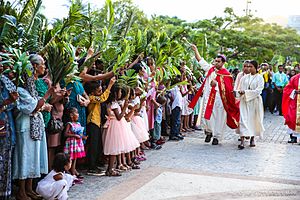
In the Roman Catholic Church and many Anglican and Lutheran churches, palm fronds are blessed outside the church. This event is called the "blessing of palms." A special procession then takes place, often with everyone in the church joining in.
- Passion Sunday: In some churches, Palm Sunday is also called "Passion Sunday." This is because the church service that follows focuses on Jesus's suffering and death.
- Saving Palms: Many churches save the blessed palms. They are burned the next year on Shrove Tuesday to make ashes for Ash Wednesday services.
- Red Vestments: Priests wear deep scarlet red clothes on this day. This color represents blood and reminds people of Jesus's sacrifice.
- Protestant Churches: In many Protestant churches, children often carry palms and walk in a procession inside the church.
- Special Prayer: The Methodist Church has a special prayer for Palm Sunday. It asks God to help people follow Jesus's example of humility and patience.
Almighty and everlasting God, who, of thy tender love toward mankind hast sent thy Son our Savior Jesus Christ to take upon him our flesh, and to suffer death upon the cross, that all mankind should follow the example of his great humility: Mercifully grant that we may both follow the example of his patience and also be made partakers of his resurrection; through the same Jesus Christ our Lord. Amen.
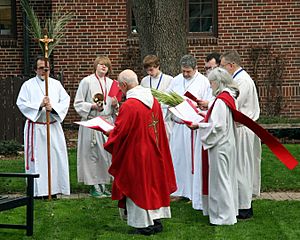
Palm Sunday Customs Around the World
Many countries have unique customs for Palm Sunday.
Belgium
In Hoegaarden, Belgium, there's a special Palm Sunday procession. A group of "Twelve Apostles" carries a wooden statue of Christ. Children go door-to-door, offering box branches for coins.
Bulgaria
In Bulgaria, Palm Sunday is known as Tsvetnitsa (Flower's Day) or Vrabnitsa (Willow Day). People whose names are related to flowers, like Lilia or Rosa, celebrate their name day on this day.
England
In England, from the 15th to 17th centuries, people would burn "Jack-'o'-Lent" figures on Palm Sunday. These straw figures were mistreated on Ash Wednesday and then burned. This was seen as a way to get revenge on Judas Iscariot or to mark the end of winter.
Ethiopia
In Orthodox Ethiopia, this holiday is called Hosanna. Blessed palm leaves are used to make crucifixes, rings, and other decorations.
Finland
In Finland, children dress up as Easter witches. They go from house to house, trading decorated pussy willow branches for coins and candy. This old custom is called virpominen. The children chant a special rhyme, wishing for a healthy year.
India
In most Catholic churches in India, priests bless palm leaves. People then receive them after mass. There's a tradition of folding palm fronds into crosses. These crosses are kept at the altar until the next Ash Wednesday.
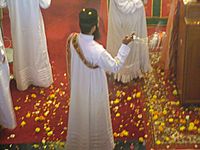
In the state of Kerala in South India, flowers are thrown around the church during the Gospel reading. This happens when the words "Hosanna! Blessed is he who is come and is to come in the name of the Lord God" are read. This custom comes from older Hindu traditions of scattering flowers on special days.
Italy
In Italy, people use palm leaves and small olive branches. They often braid the palm leaves into shapes. These branches are placed at house entrances, like above the door, and kept until the next Palm Sunday. Small olive branches are also used to decorate traditional Easter cakes.
Latvia
In Latvia, Palm Sunday is called "Pussy Willow Sunday." Pussy willows, which symbolize new life, are blessed and given to people. Children are sometimes gently woken up with a willow branch on this morning.
Lithuania
In Lithuania, people use a "verba" or "dwarfed spruce" instead of palms. On the Saturday before Palm Sunday, people carefully choose and cut branches. Women then decorate these branches with flowers, creating the "Verba."
The Levant
In countries like Israel, Jordan, Lebanon, Palestine, and Syria, Palm Sunday (Shaa'nineh in Arabic) is a very popular family church service. Children bring branches from olive and palm trees. People also make woven crosses and other symbols from palm fronds and roses. There's a procession at the start of the service, where the priest sprinkles holy water on everyone with an olive branch.
Malta
In Malta and Gozo, all parishes bless palm and olive leaves on Palm Sunday (Ħadd il-Palm). Many people take a small olive branch home, as it is considered a special blessed item.
Netherlands
In some parts of the Netherlands, crosses are decorated with candy and bread shaped like a rooster. In the Diocese of Groningen-Leeuwarden, a large procession with oil lamps is held the night before Palm Sunday.
Philippines
In the Philippines, a statue of Christ riding a donkey, or the priest on horseback, is brought to the church in a morning procession. People wave palaspás (decorated palm branches) and spread special cloths on the path. Children dressed as angels scatter flowers and sing.
After being blessed, the palaspás are taken home and placed on altars, doorways, and windows. People believe this welcomes Christ into the home and keeps away evil spirits or fires.
Poland
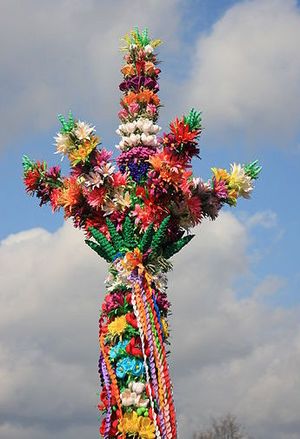
Many towns and villages in Poland hold competitions for artificial palms. Some of these palms can be over 30 meters (about 100 feet) long!
Romania and Moldova
In Romania and Moldova, Palm Sunday is known as Duminica Floriilor or simply Florii, which means Flowers' Sunday.
Spain
In Spain, especially in Elche, people cover palm leaves from the sun to make them white. Then, they tie and braid them into detailed shapes. A Spanish saying suggests wearing something new on Palm Sunday.
Syria
In Syria, children sometimes dress up as Easter witches and go door to door for coins and candy.
Wales
In Wales, Palm Sunday is called 'Sul y Blodau' ('Flowering Sunday'). It's a tradition to decorate graves with flowers on this day, especially in the industrial towns and villages of south Wales.
Images for kids
-
"Flevit super illam" (He wept over it); by Enrique Simonet, 1892
-
Palm Sunday in Malankara Church (Oriental Orthodox) of Kerala – People holding tender leaves of coconut palms (kuruthola) and flowers are thrown upwards during Gospel reading
See also
 In Spanish: Domingo de Ramos para niños
In Spanish: Domingo de Ramos para niños



